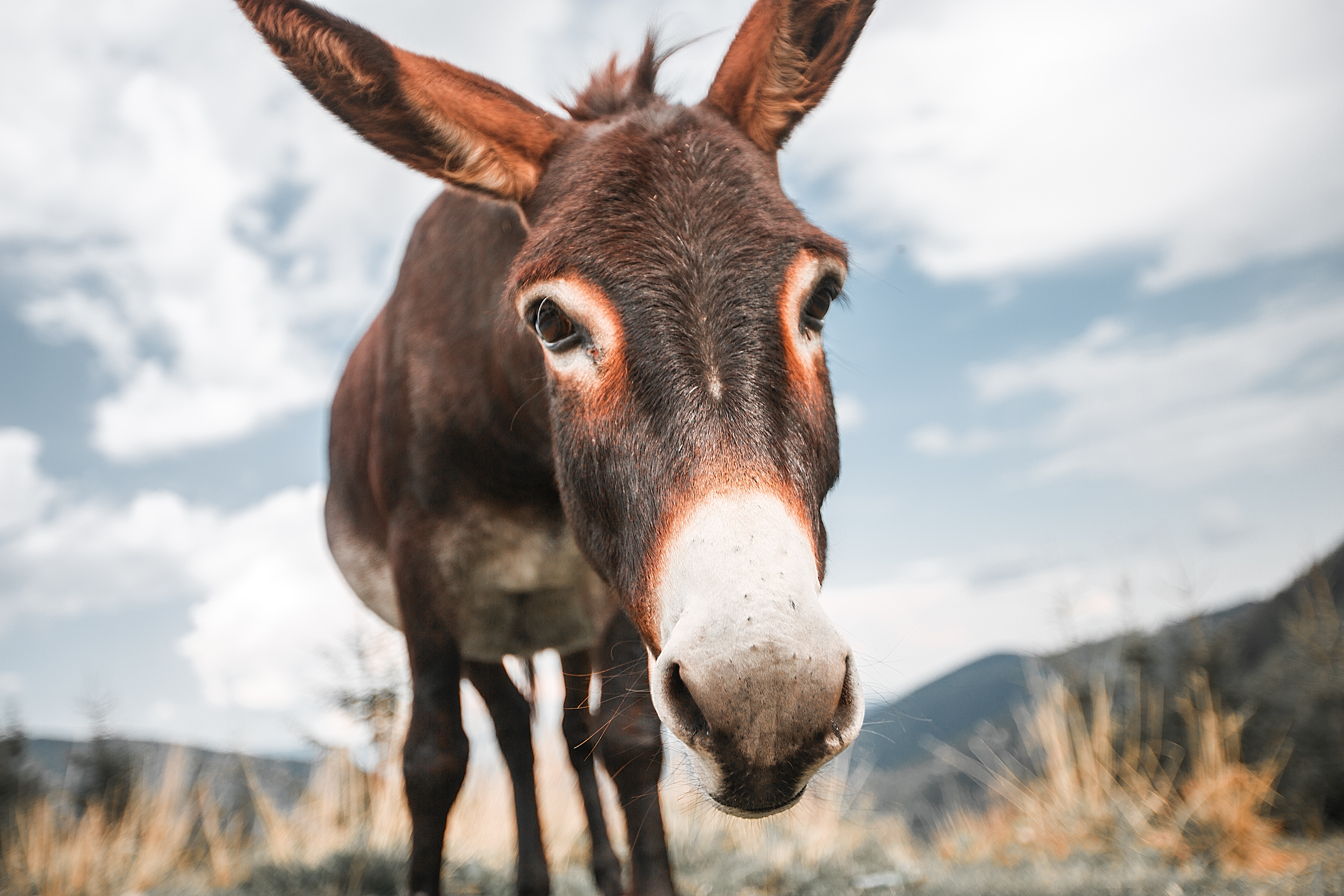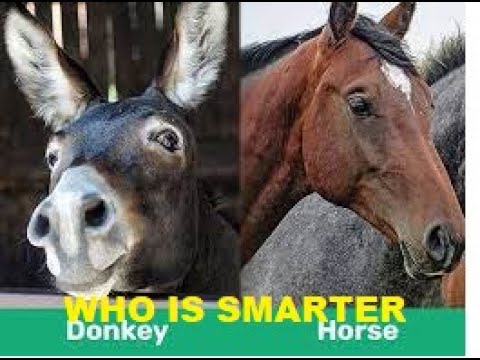Yes, donkeys are generally considered to be smarter than horses. Donkeys are often seen as more intelligent than horses because they possess a strong sense of self-preservation and are more cautious in unfamiliar situations.
They have a remarkable memory, can solve problems, and are known for their ability to learn from past experiences. Donkeys are naturally curious and have a keen sense of observation, allowing them to quickly assess their environment. While horses are also intelligent, donkeys have a reputation for being more astute and can be trained for various tasks due to their higher cognitive abilities.
We will explore the intelligence of donkeys compared to horses and delve into the reasons behind their perceived higher level of smarts. We will also discuss the implications of their intelligence on their behavior, training, and overall usefulness to humans. So, let’s dive into the fascinating world of donkey intelligence and unravel the traits that set them apart from their equine counterparts.

Credit: today.tamu.edu
Understanding The Intelligence Of Donkeys And Horses
Donkeys and horses exhibit unique intelligence in their own ways.
Behavioral Traits:
| Donkeys | Horses | |
|---|---|---|
| Sociability | Donkeys are highly social animals and establish strong bonds with their herd members. | Horses are also social animals, forming herds and relying on group dynamics. |
| Curiosity | Donkeys are known for their cautious nature, often observing new things from a distance before approaching. | Horses are often more curious and willing to explore new objects or environments. |
| Memory | Donkeys have excellent long-term memories and can remember people, places, and routines for extended periods. | Horses have impressive associative memories, allowing them to learn and remember various tasks. |
Cognitive Capabilities:
Both donkeys and horses possess remarkable cognitive abilities:
- Problem-Solving: Donkeys and horses can learn to solve simple problems, adapt to new situations, and find innovative ways to overcome obstacles.
- Learning: They have the capacity to learn through positive reinforcement, making them trainable for various tasks and disciplines.
- Communication: They use body language, vocalizations, and expressions to convey their intentions, emotions, and establish social hierarchy within their groups.
Understanding the intelligence of donkeys and horses enhances our appreciation for these beautiful and remarkable animals.
Factors Influencing Intelligence In Donkeys And Horses
Factors Influencing Intelligence in Donkeys and Horses
Intelligence in both donkeys and horses is influenced by a variety of factors including genetic predisposition, environment and upbringing, as well as social interactions and learning from their herd.
Genetics play a significant role in determining the intelligence of these equine animals. Certain breeds may have a natural predisposition towards higher intelligence, while others may display varying levels of cognitive abilities.
In addition to genetics, the environment and upbringing of a donkey or horse can greatly impact their intelligence. An enriched and stimulating environment can lead to enhanced cognitive functions, as these animals have the ability to learn and adapt to their surroundings.
Furthermore, social interactions within their herd also play a vital role in shaping their intelligence. Donkeys and horses are highly social animals that engage in herd dynamics, which involve learning from and interacting with other members of the group.
| Genetic factors impacting intelligence | Certain breeds have a natural predisposition towards higher intelligence |
| Environment and upbringing | An enriched and stimulating environment can lead to enhanced cognitive functions |
| Social interactions and learning from the herd | Donkeys and horses learn from and interact with other members of the group |
Comparing Problem Solving Skills In Donkeys And Horses
Comparing Problem Solving Skills in Donkeys and Horses
Assessing problem-solving abilities, donkeys and horses demonstrate interesting differences. Donkeys are known for their exceptional critical thinking skills, which enable them to find solutions to various challenges. Their natural instinct is to carefully analyze situations, leading them to make thoughtful decisions. Donkeys exhibit high adaptability and demonstrate a remarkable learning curve.
Horses, on the other hand, possess a different problem-solving approach. They rely more on their quick reflexes and agility to respond to situations. While they may not exhibit the same level of critical thinking as donkeys, horses excel in their ability to learn and adapt to new tasks with ease.
| Donkeys | Horses | |
|---|---|---|
| Critical Thinking Skills | Exceptional | Less Prominent |
| Adaptability | High | High |
| Learning Curve | Remarkable | Efficient |
Overall, while both donkeys and horses possess problem-solving abilities, their approaches differ. Donkeys prioritize critical thinking and exhibit exceptional adaptability and learning capabilities. Horses, on the other hand, rely on their agility and quick reflexes to navigate challenges efficiently.
Memory And Learning Abilities Of Donkeys And Horses
Memory and learning abilities are key factors in determining the intelligence of animals. Both donkeys and horses demonstrate remarkable cognitive skills, although there are some variations in their capabilities.
When it comes to long-term memory retention, donkeys have a slight advantage over horses. Studies have shown that donkeys can remember specific individuals and locations for an extended period of time, even after a long hiatus in their interactions. Horses, on the other hand, tend to have a more limited long-term memory capacity.
In terms of learning tasks, donkeys are highly adept at acquiring new skills and retaining them. They possess an impressive capacity for learning and can quickly adapt to various situations. Horses, while also capable of learning, may require more repetition and reinforcement to master new tasks.
Both donkeys and horses exhibit associative learning, where they form connections between stimuli and responses. This type of learning is essential for training and conditioning. Additionally, they have the ability to recall previously learned information when faced with familiar situations.
Emotional Intelligence In Donkeys And Horses
Emotional Intelligence in Donkeys and Horses
Animals possess a remarkable ability to understand and express emotions, and donkeys and horses are no exception. They demonstrate a range of emotional intelligence, allowing them to form deep connections with both their own kind and humans.
Empathy and emotional bonds play a significant role in their social interactions. Donkeys, known for their gentle nature, show empathy towards distressed individuals and offer comfort through physical contact or vocalizations. Horses, on the other hand, establish strong emotional bonds and develop social hierarchies within their herds.
Both donkeys and horses are sensitive to human cues and emotions, making them adept at interacting with humans. They can sense their handler’s mood, responding accordingly and demonstrating an understanding of human emotions. This sensitivity enables them to form trusting relationships with humans and excel in activities like therapy work or guiding visually impaired individuals.
Communication And Social Skills Of Donkeys And Horses
Vocalizations and non-verbal communication: Donkeys and horses have developed unique ways to communicate with each other and with humans. Both species use a variety of vocalizations, such as braying and neighing, to express their emotions and intentions. Donkeys, however, tend to have a wider range of vocalizations, including grunts, squeals, and groans, which they use to convey specific messages. In terms of non-verbal communication, donkeys use their body language, ear position, and tail movements to express feelings such as fear, dominance, or submission.
Hierarchical social structures: Both donkeys and horses have hierarchical social structures within their herds. Donkeys typically establish a clear hierarchy, with one dominant individual leading the group. In contrast, horses have a more fluid social structure, with frequent shifts in dominance. These social hierarchies play a crucial role in maintaining order, as well as in decision-making processes within the herd.
Interactions with humans and other animals: Donkeys and horses have been domesticated for centuries, leading to close interactions with humans and other animals. Horses are known for their social nature and ability to form strong bonds with their human handlers. Donkeys, on the other hand, are renowned for their cautious and independent nature. They have a strong sense of self-preservation and may require more time and patience to develop trust and bonds with humans.
Assessing Intelligence: Tests And Measures
Validity of intelligence tests in animals
Cognitive experiments on donkeys and horses
Ethical considerations in studying animal intelligence
Intelligence assessment in animals is a complex process that involves various tests and measures. When evaluating the validity of intelligence tests in animals, it is important to consider their effectiveness in capturing the cognitive abilities of different species. Cognitive experiments on donkeys and horses have demonstrated their problem-solving skills, memory capabilities, and ability to understand cues. These experiments provide insights into the cognitive abilities of these equine animals. However, it is crucial to address ethical considerations while studying animal intelligence. Researchers must ensure the well-being and proper care of the animals involved in these experiments, minimizing any potential harm or stress. By conducting experiments ethically and using suitable tests, we can gain a better understanding of the intelligence levels of animals, including donkeys and horses.
Frequently Asked Questions For Are Donkeys Smarter Than Horses
Are Donkeys Smarter Than Horses?
Donkeys and horses are both intelligent animals, but they have different types of intelligence. Donkeys are known for their problem-solving abilities and their cautious nature, while horses are known for their quick learning capacity and sociability. So, it’s difficult to say which is smarter as they excel in different areas.
Conclusion
The intelligence of donkeys and horses is not a matter of one being inherently smarter than the other. Both animals possess unique abilities and individual strengths that make them highly intelligent in their own ways. While donkeys may excel in problem-solving and memory retention, horses showcase exceptional adaptability and social intelligence.
Understanding and appreciating their differences can enhance our interactions and ensure their well-being in various roles they play in our lives.

